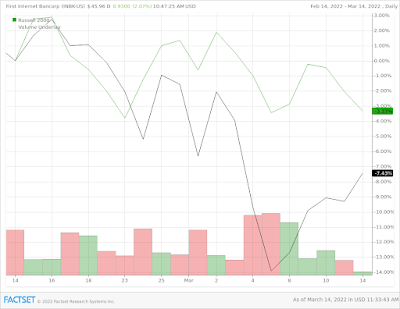First Internet Bancorp (INBK,
$45.03): “Climbing With the Rate Hikes”
By: August Peterson, AIM Student at
Marquette University
Disclosure: The AIM Small-Cap
Equity Fund currently holds this position. This article was written by myself,
and it expresses my own opinions. I am not receiving compensation for it, and I
have no business relationship with any company whose stock is mentioned in this
article.
Summary
- First Internet Bancorp
(INBK) is an online
regional bank holding company offering commercial and retail banking
products and services to individuals primarily in the Midwest. As of Q4
2021, the company has $4.2 billion in total assets and approximately $3.0
billion in total loans.
- Management has weathered the risk of interest rate
sensitivity to Net Interest Income by adjusting its deposit composition to
favor Non-Maturing Deposits over CDs & Brokered Deposits and MMDA
& Savings accounts.
- Future Net Interest Margin expansion is anticipated due
to CD repricing in the next twelve months, a higher yield on assets from
the First Century merger, and deployment of FCB’s excess liquidity to
retire the Bank’s high-cost deposits.
- Despite management’s risk-parity approach to minimizing
deposit betas and their strong capital allocation strategy, the market
continues to price INBK at a ~40% discount, as evidenced by an
unreasonably low P/TBV multiple.
Key points: With escalating geopolitical
tensions, rising inflation, and a Federal Reserve expected to raise rates seven
times in 2022 according to the CME as of March 10th, a flattened
yield curve poses a material threat to regional banks. Since the difference
between the 10-year and 2-year treasury yield is only ~25bps, the interest paid
by banks to customers has nearly converged to the interest generated from
investments. According to INBK’s Q3 interest rate sensitivity analysis, an interest
rate increase of 100bps reduces the company’s net interest income by 65bps over
a twelve-month period. Despite this, INBK has positioned itself to undermine the
risk of interest rate hikes in Q1 2022.
Non-Maturity Deposits (NMDs) have no stated
maturities and allow for customers to withdraw funds at any point in time (i.e.,
retail savings, interest and non-interest-bearing checking accounts, money
market accounts, etc.). Due to their short-term maturity and repricing nature, NMDs
are characterized by their low sensitivity to interest rate risk, or deposit
beta. In anticipation of the Fed’s expected rate hikes this year, INBK has
improved its deposit composition by holding a larger percentage of NMDs (2.8%
increase since 3Q21) and a smaller percentage of MMDA & Savings accounts (0.84%
decrease) and CDs & Brokered Deposits (7.1% decrease).
INBK saw a favorable fourth quarter as net income
and diluted EPS ended the fiscal year up 63% and 61%, respectively, over 2020
results. Net Interest Margin (NIM) increased 30 bps to 2.30% from 2.00% in the
third quarter, driven by a 22bp increase in the company’s yield on loans and a
6bp decline in the cost of interest-bearing deposits. NIM growth is expected to
continue as $712.8 million CDs with a weighted average cost of 1.02% will mature
in the next twelve months, and replacement costs are currently in the range of
~0.55%. Simply put, the company’s yields on assets are increasing while deposit
costs are decreasing. CD repricing coupled with a deposit composition favoring
NMDs, which provides a cheaper source of funding for the Banks’ assets than
other means, will catalyze future NIM expansion.
INBK’s partnership with ApplePie and the acquisition
of First Century Bancorp (expected to close 1H22) are proving to be lucrative.
ApplePie Capital, a franchise loan marketplace that sold $100 million of its
core conventional loans to INBK in 4Q21, has given the company a strong
franchise pipeline with a growing SBA loan portfolio. Franchise loan balances
were up 218% to $81.4 million from 3Q21, and SBA loans have grown nearly 6%
over the same period. Since only ~7.8% of First Century’s total assets are
comprised of loans, INBK management has decided to use $150 million of its
excess liquidity to retire the company’s high-cost deposits and use another
$150 million to purchase securities at yields close to 1.5%. The merger will
effectively raise asset yields as INBK’s current excess cash earning an average
yield of only 0.33% will be reduced while securities earning ~1.5% will be
gained. NIM will further expand as higher-cost deposits will be retired.
What has the stock done
lately?
Since
being inducted into the AIM Small Cap Fund, INBK is up ~1.5%. The stock reached
an all-time high at $52.80 following its earnings release on January 19, 2022,
before a steady decline to today’s price. INBK followed the performance of the
Russell 2000 closely until it announced its merger with First Century Bancorp
on November 2, 2021, when the stock jumped over 25% in a single day.
Past Year Performance: Despite a negligible change in the stock’s
price since November, INBK still remains undervalued as the company’s P/TBV of
~1.2x falls short of a regional/tech-centric bank peer average of ~1.7x. With a
P/E of 9.8x and EPS growth anticipated to add another dollar from the merger of
First Century in 2022, it’s safe to say that Ben L’Empereur’s thesis remains
palatable.
My Takeaway
Management
has aptly positioned INBK to mitigate the risk of high deposit betas from the
Fed’s expected seven rate hikes in 2022. Several factors are expected to
catalyze expansion in the Bank’s NIM in the coming years; CD repricing in the
next twelve months (weighted average cost 1.02% compared to current replacement
cost ~0.55%), changing deposit composition favoring NMDs (cheaper source of funding
for Bank’s assets), and the deployment of excess capital from the First Century
merger. It’s evident that management understands how to weather interest rate
risk while being exceptional capital allocators. Despite this, The Street
continues to price First Internet Bancorp at a ~40% discount per relative valuations.










